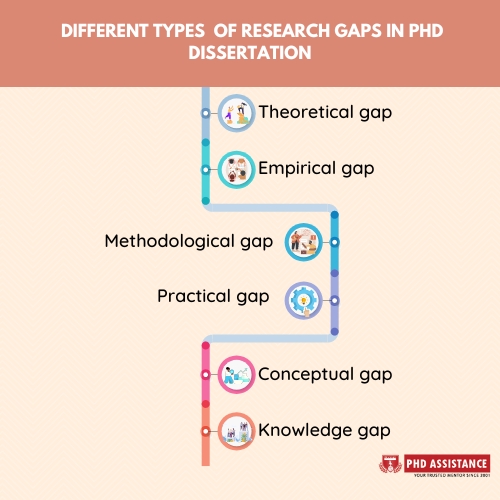What are the different types of research gaps in a PhD Dissertation?
Research gaps are the areas of knowledge that have not been extensively explored or remain unaddressed within a particular field or topic. Recognizing and addressing these gaps is crucial for advancing knowledge and ensuring the significance and originality of a PhD dissertation. This blog explores the various dimensions of research gaps, their implications, and the strategies that can be employed to identify and fill these gaps effectively.
Introduction
How to identify the research gap?
Identifying research gaps involves a comprehensive review of existing literature, critically analyzing previous studies, and exploring areas where existing knowledge falls short. Researchers must examine the limitations and shortcomings of existing research, identify unanswered questions, and explore unexplored aspects within their chosen field. This process requires critical thinking, a deep understanding of the subject matter, and familiarity with the existing scholarly discourse.
There are several types of research gaps, including:
- Theoretical gap: This refers to a gap identification in the existing theories and models in the field that have not been addressed adequately.
- An empirical gap refers to a gap in the available data or empirical evidence in the field which is insufficient to answer specific research questions.
- Methodological gap: This refers to a gap in the literature review research methods and techniques used in previous studies, which may limit the accuracy and validity of the findings.
- Practical gap: This refers to a gap between theory and practice, where there is a need for more research to bridge this gap and improve the application of theory in practice.
- Conceptual gap: This refers to a gap in understanding key concepts and terminologies in the field, which may lead to inconsistent or unclear definitions and interpretations.
- A knowledge gap is a gap in the knowledge base where specific topics or areas have not been sufficiently explored or studied.

What is a Research Gap example?
Research Gap Example: The Impact of Social Media on Adolescent Mental Health
While studies have shown a correlation between social media use and negative mental health outcomes in adolescents, a research gap exists in understanding the specific mechanisms and causal pathways involved. Existing research has focused on associations rather than exploring the underlying reasons behind the impact of social media on adolescent mental health.
To address this research gap, future studies can adopt longitudinal designs and advanced biostatistical methods to examine the temporal relationship between social media use and mental health outcomes. Additionally, qualitative research methods like interviews or focus groups can provide insights into adolescents’ subjective experiences and perceptions regarding social media use and its impact on mental health.
Conclusion
By conducting an in-depth analysis of the research gaps that exist within a PhD dissertation, this blog aims to provide a comprehensive understanding of their significance and implications. It also offers practical guidance and strategies for identifying and filling these gaps in service marketing, thereby enhancing the quality and impact of research. Ultimately, this dissertation contributes to the broader scholarly community by promoting rigorous and innovative research practices.
PhD Assistance
At Ph.D. Assistance, our expert course writers have vast experience handling specialized areas like research methodology and statistical analysis using sophisticated software like SPSS, statistical review, citation review, etc. Our Expertise will Analysis the gap for your PhD. A dissertation that gives scope to your Complete research. We have a team of research specialist who collaborates and analyzes the gap of research based on a PhD thesis topic and will help you to explore your thesis from a more recent and advanced perspective
References
HR, Ganesha, and P. S. Aithal. “PHDRQ Model for Identifying Research Gaps and Formulating A Research Question During Ph. D. Program in India.” International Journal of Case Studies in Business, IT, and Education (IJCSBE) 6.2 (2022): 408-421.



